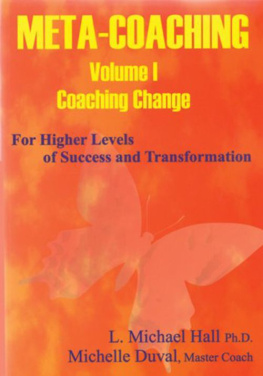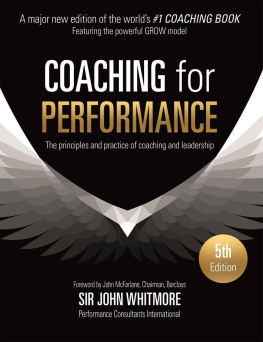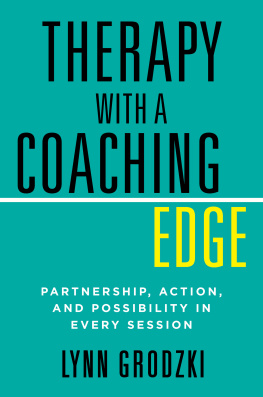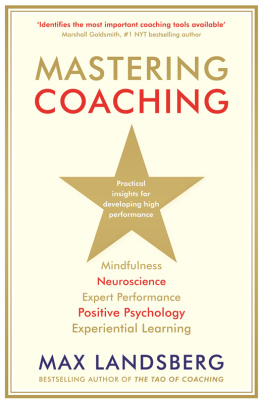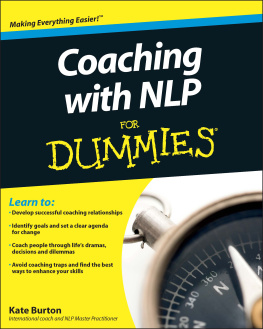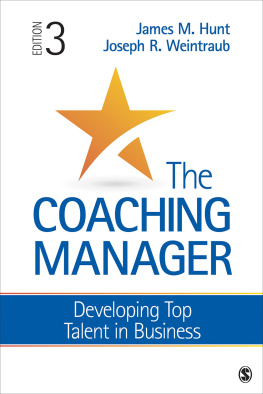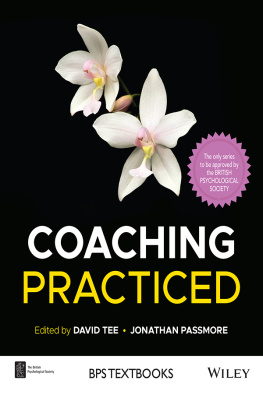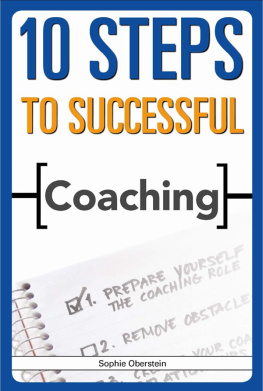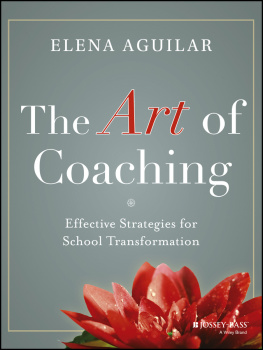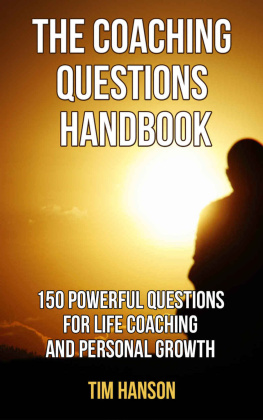METACOACHING
Volume I:
Coaching Change
Reaching Higher Levels of Success and Transformation c
L. Michael Hall, Ph.D.
and
Michelle Duval, Master Coach
2004 META-COACHING : Coaching Change, Volume I Reaching Higher Levels of Success and Transformation L. Michael Hall and Michelle Duval
Library of Congress, Washington, D.C. Copyright number pending.
ISBN 1-890001-27-9
All rights reserved.
No part of this may be reproduced, stored in a retrieval system, or transmitted in any form or by any means (electronic, mechanical, photocopying, recording, etc.) without the prior written permission of the publisher.
Published by: Neuro-Semantics Publications P.O. Box 8
Clifton, CO. 81520-0008 USA
Authors: L. Michael Hall, Ph.D. P.O. Box 8
Clifton, CO 81520 (970) 523-7877
Michelle Duval, Master Coach Equilibrio
148 New South Head Rd. Suite 1 Edgecliff , NSW 2027
Australia
Neuro-Semantics is the trademark name for the International Society of Neuro-Semantics. For more than 2000 pages of free information , see the web sites:
www.neurosemantics.com www.meta-coaching.org www.self-actualizing.org www.equilibrio.com.au
META-COACHING
Table of Contents
4. Coaching Premises Meta-Cognitive Frameworks 73
17. Coach as a Change Agent 315
18. Benchmarking Axes of Change Competencies 330
Authors 367
Michael Hall
Michelle Duval
PREFACE
If this book, as the first in a volume of books is on coaching and specifically Meta-Coaching, then
C What is coaching?
C What is Meta -Coaching?
C Why should you buy this book?
C Whats new, different, unique, and worth spending time and money on it?
Coaching is a new and exciting field thats focused on personal enrichment and empowerment. We see its purpose and design as being that of mobilizing a clients resources to an agreed upon outcome. This means that coaching is all about tapping into our hidden and undeveloped potentials to awaken them so that we can take our skills and our experience to a new level of performance. To that end, we can now use coaching to empower ourselves and others to develop our best thinking, feeling, speaking, behaving, and relating.
Meta-Coaching takes things further and higher. As a specific coaching methodology, a set of processes and models for working at a higher or meta level to a clients experience Meta-Coaching is about facilitating the awakening transformation itself. We have added the term meta to coaching. The term itself simply refers to a higher level, to the structural level of experience. And it is at that level that the best coaches work. Coaching itself is a meta-profession for this reason. And as a truly unique profession, coaching deals very little with content and almost entirely with form. We use the term meta to highlight this facet of coaching. In this, Meta-Coaching is the premier process for actualizing ones fullest potentials and talents.
In meta-coaching a coach directs his or her attention at a level higher to a clients performance, states, attitudes, and beliefs in order to work with the very structures of the mind-body-emotion system which facilitates and unleashes peak performances.
Whats in This Book
When you invest in this book, what will you get? Whats in this book that will be worth your time, energy, and money? Several things.
First, something unique to coaching books, namely, the theoretical frameworks for coaching and meta coaching. While there are many books on Coaching 101 these days, few seriously explore the premises and foundations of the field itself. You will find that in this first volume of Meta-Coaching. Here we explore the foundations of a coaching psychology, a psychology that is preeminently cognitive-behavioral in nature and one founded in the principles of how people grow, develop, and realize their potentials. The frameworks of coaching here go beyond the foundational models to the cognitive-behavioral models of Neuro-Semantics. These include three cutting-edge models: the MetaStates model, the Matrix model, and the Axes of Change model.
Second, these governing frameworks not only inform and govern meta coaching but also are designed to raise the level of skill, competency, and artistry in the field of Coaching. Without a solid framework in the hands of a well-grounded professional coach, coaching can easily degrade to a fluffy and vague grab bag of tricks used by the unskilled. With the Neuro-Semantic models, our vision is to set a benchmark for quality coachingcoaching thats effective and transformative.
Third, as part of the Coaching Frameworks, we here present in some detail three essential models from Neuro-Semantics for coaching, the self-actualizing model, the Meta-States model, and the Matrix model.
Fourth, this book highlights the importance of benchmarking as a coaching and consulting skill. What is benchmarking in the context of coaching? It is the ability to quantify our terms and operationalize our skills and processes. Thats important in order that we be able to mark and measure the effectiveness of our tools and of coaching itself.
Fifth, because this book focuses centrally on a core facet of coaching, namely, change, it is about Coaching Change. Half of this book presents the first (and at this date) the only non-therapeutic change model for Coaching. As you learn about the Axes of Change model you will discover the very mechanisms of change and the coaching roles around change that makes a coach truly effective as a change agent. In that model you will discover how to dance with the eight coaching roles for effectively facilitating change.
Sixth, we end each chapter with a call to action, Coaching Tasks. Since knowing comes from doing , we use the coaching modality to end each chapter by inviting you to do something about what youve read. This lies at the heart of the power and genius of coachingfacilitating action in people.
The next volume of Meta-Coaching will highlight numerous domains, facets, or niches of Coaching and present application chapters regarding how meta -coaching applies to various kinds of coaching: self-coaching, personal coaching, internal, executive, organizational, team coaching, etc. There also we will provide a detail case study of what occurs in meta-coaching sessions and programs.
Who is Meta -Coaching Written for?
Professional Coaches and Managers. This book is especially written for anyone who works professionally as a coach, whether full-time or as an aspect of ones job descriptions, and for anyone in management who uses coaching as a method for communicating and relating. While meta coaching contains a lot of new and revolutionary models and can be considered advanced material for people who work with and through other people, at the same time it is all human stuffthe best patterns, models, and skills and so for anyone who works with the resources of mind-emotion and communication that are fundamentally human.
Change Agents. Those who are involved in any kind of facilitation for change, those involved in training and development, coaching in a specific domain to actualize the best in others, managers, business leaders, consultants, entrepreneurs, etc. will gain much value from Meta-Coaching . It will introduce to you the cutting-edge models and tools of Neuro-Semanticsmodels and tools that offer to take the field of coaching to a new and higher level.
Those committed to Self-Development. This book is also written for those who are committed to their own learning and change, to their own ongoing development as a human being and in terms of their skills and competencies. For anyone who has made the commitment to be the best one can be, this book will provide the models and patterns that will enable them to move to the place of self-coaching.

